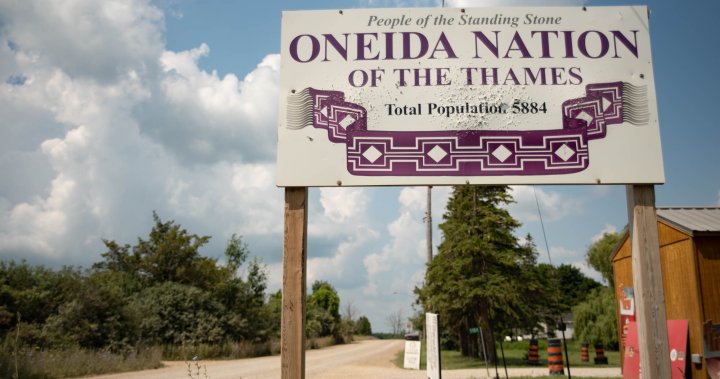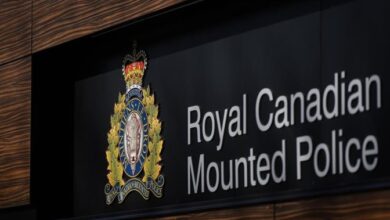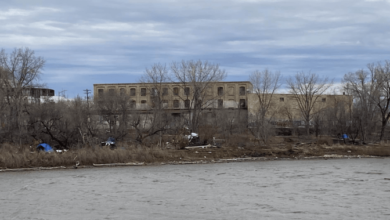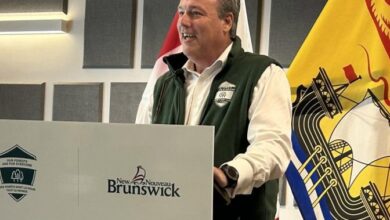Ottawa pledges $43M for clean drinking water on Oneida Nation of the Thames

The federal government will invest $43 million in a bid to bring clean drinking water to residents of a London-area First Nation who have been under a drinking water advisory for more than two years, officials with the community said Thursday.
The move will see Oneida Nation of the Thames switch to Lake Huron as its main water source, and have its existing piped distribution system upgraded and expanded, bringing reliable and sustainable safe drinking water to more than 500 homes and community buildings, officials said.
The funding from Indigenous Services Canada (ISC) will support the design and construction of the project, which is expected to take between 18 and 24 months to complete, for a late 2024 to early 2025 finish, officials said.
“Water is life. It’s been a long road, and while we have been resilient, we know that clean water is vital to the overall health of our community,” Oneida’s elected chief, Todd Cornelius, said in a statement.
“I look forward to the day when our community can drink water by simply turning on their tap. It’s time to get to work on making this a reality. I want to thank the people of Oneida and the Administration who have endured this process and worked to finalize this agreement.”
The upgrades will also mean improved fire protection for the existing community, and for homes and other buildings that have yet to be developed, officials said.
Oneida residents learned of the news on Wednesday as the community marked World Water Day, the international day to raise awareness of the more than two billion people around the world without access to safe water, officials said.
Oneida has been under a long-term drinking water advisory since September 2020, and before that had been under a self-imposed boil water advisory for a year.
The announcement has been a long time coming.
For years, Oneida Nation residents and leaders have called for improvements to be made to the community’s water infrastructure, including moving the First Nation’s water source away from the Thames River, which can be polluted upstream with raw sewage during heavy rainfall.
An investigation in 2019 by the Toronto Star and Ryerson School of Journalism, in collaboration with outlets including Global News, found that Oneida’s water distribution system, which is operated by the First Nation with ISC oversight, had not met provincial standards going back to 2006.
Eighteen years of water quality testing across the First Nation sometimes showed striking levels of pathogens including E. coli from faucets, the investigation also found.
Neighbouring non-Indigenous communities use water sourced from the Lake Erie Primary Water Supply System, or from the Lake Huron Primary Water Supply System, which Oneida will soon be connected to. London receives water from both.
In December, the community declared a state of emergency after recording an “all-time low” level in its water tower, prompting monetary and water donations from the community, and further calls for government action on the longstanding issue.
In January, Global News reported that Oneida and federal officials were cautiously optimistic that construction would begin in the spring on an 18-kilometre-long pipeline connecting the First Nation to the Lake Huron Primary Water Supply System.
In a statement Thursday, Patty Hajdu, Canada’s minister of Indigenous services, congratulated Chief Cornelius and those involved in helping make the project a reality, saying she was confident that their work “will protect access to fresh water for generations to come.”
The Trudeau government promised to end all long-term drinking water advisories when it was first elected in 2015. So far, 138 advisories have ended, but there are still 32 active in 28 communities as of early February, according to the federal government.
In December, another London-area First Nation, Chippewas of the Thames, was placed under a long-term drinking water advisory affecting 365 homes and 20 community buildings. The community went under a precautionary boil water advisory a year earlier.
The advisory is in place “because water production cannot meet the current demand,” according to a notice on the website of Indigenous Services Canada.
“ISC is working in collaboration with the First Nation to implement their action plan to address the long-term drinking water advisory,” the notice from Dec. 14, 2022, says.
“A bottling station to mitigate the need for bottled water is now under construction. Repairs to the distribution system to address any leaks are complete. A feasibility study is currently underway to assess options to meet the community’s long-term drinking water needs.”
In April 2022, the federal government announced it had set aside roughly $1.5 billion to compensate Indigenous people who have been without clean drinking water, the result of a class-action suit initiated by Neskantaga First Nation, Curve Lake First Nation and Tataskweyak Cree Nation in 2019.
The court approved a settlement agreement on Dec. 22, 2021.
The settlement will compensate people living in communities that were subject to a drinking water advisory of at least one year between November 1995 and June 20, 2021. The settlement claims period is open and people can submit a claim until March 2024.
The settlement also included a $400 million First Nation Economic and Cultural Restoration Fund, and a promise of “making all reasonable efforts” to repeal the Safe Drinking Water for First Nations Act.
— with files from The Canadian Press, and Marshall Healey, Jake Jeffery of Global News
© 2023 Global News, a division of Corus Entertainment Inc.
Get Best News and Web Services here







